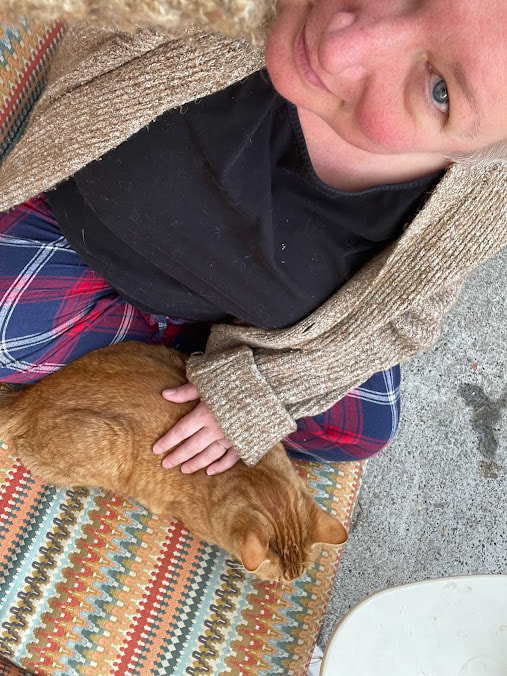|
My Christian faith started evolving 25 years ago, but the kernel or promise of change was embedded in my heart since childhood. The catalyst for my transformation was the fire of grief, which cracked me open and left me exposed. Community, in the form of women’s friendship and wisdom, tended me, planted me deeply in cool soil, and gave me room to grow. My father died when I was 18. I was in college at an Evangelical Christian school. In the following year, I attempted suicide. My family of origin slid into a state of alienation from each other. I was angry and bereft, rude and out of control. I struggled against everything and everyone. Something essential in me prevailed and was witnessed. Other women saw it. I received compassion and insight from female professors at the college. They brought me to church, a woman-lead Episcopalian congregation. They taught me about feminism, new-to-me theologies, women’s perspectives and experiences conveyed by women authors in narratives and poetry. I learned about the entanglement of Christian religion with colonialism. I reached out and met other female students wrestling with the same ideas and stretching into their own awakenings. I prayed and played with God alongside the guidance of an eclectic and faithful spiritual director. Among the many books I read, were Jane Eyre and Wide Sargasso Sea. Those two books depict the life of Bertha, the first wife of Jane Eyre’s Mr. Rochester. He locked Bertha away as a madwoman, but before she met him she was free, roaming a lush paradise, beholden to no man and no other way of being. Ultimately, Jane Eyre tells us, Bertha burns down the house that is her prison, and her life ends in the flames. This character captured my imagination as an icon for the divine. She was a depiction of God before and after men’s language and power structures locked the divine into dogma and authority. I started to perceive and honor the divine as the “Madwoman in the Attic.” I composed a story about hearing Her in the house made by men and sneaking up to her door. After college, I struggled in the ways that many recent graduates do. Adjusting to the independence and responsibilities of an adult is challenging. The community that I’d known was gone, each woman to her own place and work and relationships. The books remained but a group that lived in response to those words, perspectives, and visions did not exist. There was no “there” there. I yielded to daily life. I found connection and fun with new friends. I misplaced the vitality and piercing perception of my early twenties. I harbored the icon of the Madwoman in my heart and lodged myself on the threshold of her room. A few weeks before my thirtieth birthday I moved across the country to Seattle for graduate school. It was my fresh start, far from my family, my personal history, the church I grew up in, the politics I did not subscribe to. The Madwoman resurfaced in my graduate studies and occupied a central role in my thinking and writing. As I drafted my thesis I heard Her call. She did not reveal Herself to me in the upper room of the house, which I had hoped and expected. Rather, She bid me retrace my steps and meet Her in each person I met as I traveled back down through the house. I had received a call. I had conviction and vocation. There was vitality and vision, again! Within a month of receiving approval of my thesis, I married. Within a year of marrying, I gave birth to a son. Not long after that, I recognized that the marriage was over, but it was years before we separated and the divorce was finalized. Those were lean years of providing the single source of income for our family. Those were committed years of tending my mental health with therapy and medication. Those were learning years of finding spiritual community in a group of pagan women. I considered it a tentative descent from the Madwoman’s attic. I am 45 years old. I’ve returned home to Seattle from Evolving Faith ‘19 and the Madwoman’s call is renewed boldly within me. Perhaps she is more precise, now, or perhaps my ears have cleared to hear. She says, “Perceive me in everyone you meet. Everywhere. Do not be bound by walls or ways or words. Burn down the house.” I don’t believe that God is crazy. Nor do I believe that God is locked in conventional theology, dominant culture, or approved religious practices. Burning down the house does not threaten God, just like composing other narratives or engaging new-to-me theologies or participating in previously unfamiliar communities doesn’t threaten God. Burning down the house might set me free to meet God, newly; to honor God, newly; to meet and honor you. There’s still no “there” there, for me. I don’t have a local community that I can simply join for resonance and support, teaching and service. I miss that. I understand, now, the best parts of a house of worship. Even so, I proceed. I am making it up as I go, one step at a time, down from Her attic and into the company of Her people, who are everywhere.
1 Comment
Roberta
10/11/2019 01:53:26 am
Thank you for sharing this part of your story. It is very personal and very precious. I also long for greater "connection" with Spirit and with others, and yet my life does not allow a lot of interaction right now, Still...sending love and blessings over time and space to you, Jenni
Reply
Leave a Reply. |
About Jenni God is the madwoman in the attic.
I'm camped out on the threshold with my journal, camera, & plenty of snacks. God is the madwoman in the attic.
I'm camped out on the threshold with my journal, camera, & plenty of snacks.
Categories
All
Out of the Attic
This blog started in 2006
on Blogger as Out of the Attic. I began posting here in April 2014. Please visit the original site for the rest of the story on topics like: |
 RSS Feed
RSS Feed




